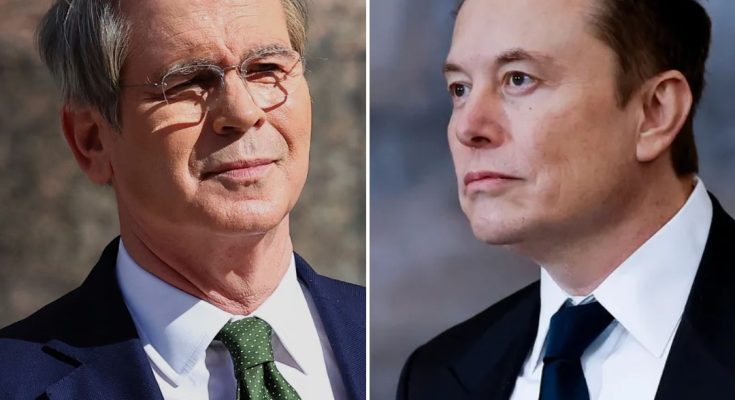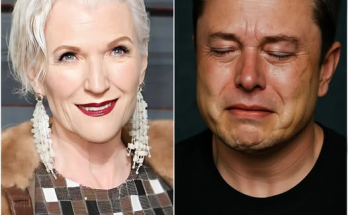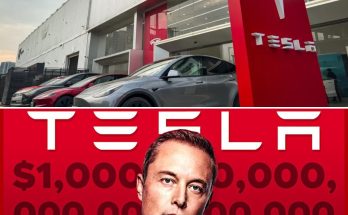The tension between corporate influence and government oversight reached a new apex this week as a heated dispute erupted inside the White House between Elon Musk and U.S. Treasury Secretary Scott Bessent. According to sources with direct knowledge of the incident, the confrontation, centered around the appointment of a new acting IRS director, escalated into what was described by one witness as a near-physical altercation just steps away from the Oval Office.The clash, described by political insiders as shocking even by the chaotic standards of the current administration, marks a critical moment in the ongoing debate about the role of billionaires like Musk in federal governance and policy-making. The dispute reportedly began during a high-stakes meeting on tax enforcement policy, where both Musk and Bessent were present to discuss the leadership vacuum at the Internal Revenue Service.At issue was who should assume the position of acting director after the resignation of the previous officeholder. Musk, who has become increasingly involved in administrative matters through his role in the Department of Government Efficiency (DOGE), strongly advocated for Gary Shapley, a former whistleblower and IRS agent known for his tough stance on internal corruption and data security. Musk viewed Shapley as a reformist who could modernize the agency and ensure it aligned with Musk’s vision of a streamlined, digitally responsive government apparatus.Bessent, however, had other plans. He pushed for the appointment of Michael Faulkender, the Treasury’s current Deputy Secretary and a loyalist to the department’s longstanding bureaucratic framework. Faulkender represents continuity, institutional expertise, and alignment with fiscal conservatism. Bessent reportedly saw Musk’s endorsement of Shapley as an attempt to bypass Treasury authority and impose an outsider with an unorthodox agenda on a critical federal agency.The discussion quickly turned hostile, as Musk accused Bessent of protecting a bloated and outdated IRS for political reasons, while Bessent fired back that Musk was acting like a tech oligarch attempting to hijack democratic governance. The verbal sparring intensified and, according to individuals present, reached a fever pitch with shouting heard from adjacent corridors.Security personnel and aides intervened when the two men reportedly moved within inches of each other in a confrontation that bordered on physical aggression. Sources within the West Wing described the moment as surreal and chaotic, a dramatic scene of two powerful men—one a government official, the other a billionaire entrepreneur—locked in a theatrical display of ego, ideology, and political rivalry. Despite the intensity of the confrontation, no physical blows were exchanged, and both men were eventually escorted from the vicinity of the Oval Office.President Trump was reportedly in the area and observed part of the altercation firsthand. Later that day, in a move that seemed to tilt toward the Treasury’s position, Trump announced that Faulkender would be installed as the acting IRS director. The decision sparked immediate backlash from Musk’s supporters within the administration, some of whom saw the choice as a betrayal of DOGE’s mission to disrupt and modernize government operations.The outcome not only solidified the Treasury Department’s influence but also called into question the extent of Musk’s political clout inside the Trump White House, where he had previously enjoyed substantial latitude. The incident sheds light on deeper tensions within the administration regarding the balance of power between traditional bureaucratic institutions and outsider influence. It also underscores the growing unease around Musk’s expansive role in federal affairs.Once celebrated for bringing innovation and tech-driven efficiency to government, Musk is now increasingly viewed as a polarizing figure whose involvement often generates as much instability as it does transformation. His attempts to influence IRS leadership illustrate the complex and sometimes uncomfortable intersections between private sector innovation and public governance.From a policy standpoint, the dispute reveals a critical battle over the future of federal tax enforcement. Shapley, Musk’s preferred candidate, is known for advocating aggressive digital audits and leveraging AI-driven monitoring systems to improve efficiency and reduce fraud. His appointment would likely have led to sweeping reforms in how the IRS operates, potentially centralizing data systems and increasing automation in audits and taxpayer services.Critics feared this would reduce transparency and create vulnerabilities in privacy, while supporters saw it as a necessary leap into the future. Faulkender, by contrast, brings a more traditional vision, emphasizing procedural integrity, measured reform, and continuity.His appointment signals a preference for institutional stability at a time when federal agencies are under increasing scrutiny and strain. Bessent’s success in securing his promotion underscores the resilience of Washington’s entrenched bureaucratic systems, even amid aggressive reform agendas championed by figures like Musk.The fallout from the confrontation has been swift and multifaceted. White House spokespeople sought to downplay the episode, describing it as a passionate exchange between individuals committed to public service. Yet insiders acknowledge that the event has sparked concern among staffers and raised questions about the administration’s internal cohesion. Some members of Congress have privately expressed alarm over the apparent chaos, while watchdog groups have renewed calls for clearer boundaries between private influence and public decision-making.For Musk, the incident represents a significant blow to his image as a government reformer. His critics have seized on the clash as evidence of his overreach, portraying him as a businessman unwilling to respect the checks and balances of public administration. Musk’s silence following the appointment of Faulkender has only added to speculation that his influence in Washington may be waning. Though still a formidable force through DOGE and his array of private ventures, Musk now faces the challenge of recalibrating his political strategy in a landscape that appears increasingly resistant to his interventionist approach.Bessent, meanwhile, has emerged from the encounter emboldened. His ability to resist pressure from one of the world’s richest men and secure his preferred candidate reinforces his position as a key power broker in the Trump administration. It also enhances his reputation as a steward of institutional resilience at a time when many federal agencies are struggling to maintain their authority in the face of external disruption.The political ramifications extend beyond the individuals involved. The IRS, already embroiled in debates over funding, scope, and surveillance authority, now finds itself at the center of a symbolic power struggle. The leadership controversy has cast a spotlight on how major appointments are influenced not only by merit and experience but by personal rivalries and ideological battles.It raises critical questions about the independence of public agencies and the influence of unelected power players in shaping policy from behind the scenes. Looking ahead, the Musk-Bessent confrontation may serve as a cautionary tale for other figures seeking to bridge the gap between private innovation and public governance.The collision of agendas, egos, and institutional priorities is a reminder that reform, no matter how urgent or well-intentioned, must be pursued through collaboration and consensus rather than conflict and coercion. Musk may yet continue to play a pivotal role in the federal landscape, but the events at the White House suggest that his methods may need adjustment if he hopes to remain an effective agent of change.As the administration moves forward, the legacy of this altercation will linger in Washington’s corridors of power. It will shape perceptions of Musk’s political influence, define Bessent’s leadership trajectory, and influence how future appointments are negotiated and contested. More broadly, it reflects the ongoing struggle to determine who truly governs in an era where the lines between technology, capital, and statecraft are increasingly blurred. The battle over the IRS may be over for now, but the war for control of America’s administrative future has only just begun.
Breaking (3 min ago): Elon Musk and the U.S. Treasury Secretary clash explosively over IRS power—this showdown at the White House could reshape the future of tax policy



